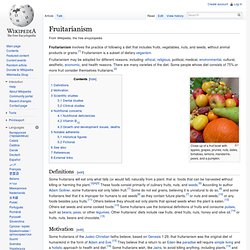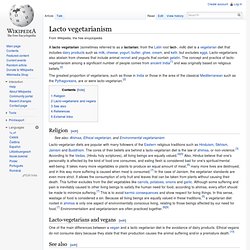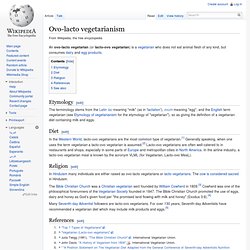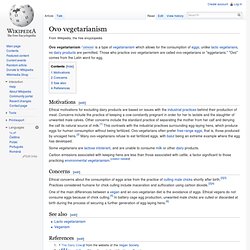

Vegetarianism Know How. List of vegans. Fruitarianism. Fruitarianism involves the practice of following a diet that includes fruits, vegetables, nuts, and seeds, without animal products or grains.[1] Fruitarianism is a subset of dietary veganism.

Fruitarianism may be adopted for different reasons, including: ethical, religious, political, medical, environmental, cultural, aesthetic, economic, and health reasons. There are many varieties of the diet. Some people whose diet consists of 75% or more fruit consider themselves fruitarians.[2] Close-up of a fruit bowl with apples, grapes, prunes, nuts, dates, tomatoes, lemons, mandarins, pears, and a pumpkin.
Lacto. The greatest proportion of vegetarians, such as those in India or those in the area of the classical Mediterranean such as the Pythagoreans, are or were lacto-vegetarian.[2] Religion[edit] Lacto-vegetarian diets are popular with many followers of the Eastern religious traditions such as Hinduism, Sikhism, Jainism and Buddhism.

The cores of their beliefs are behind a lacto-vegetarian diet is the law of ahimsa, or non-violence.[3] According to the Vedas, (Hindu holy scriptures), all living beings are equally valued.[4][5] Also, Hindus believe that one's personality is affected by the kind of food one consumes, and eating flesh is considered bad for one's spiritual/mental well-being. It takes many more vegetables or plants to produce an equal amount of meat,[6] many more lives are destroyed, and in this way more suffering is caused when meat is consumed.[7] In the case of Jainism, the vegetarian standards are even more strict. Pesco. Ovo-lacto. Etymology[edit] The terminology stems from the Latin lac meaning "milk" (as in 'lactation'), ovum meaning "egg", and the English term vegetarian (see Etymology of vegetarianism for the etymology of "vegetarian"), so as giving the definition of a vegetarian diet containing milk and eggs.

Diet[edit] In the Western World, lacto-ovo vegetarians are the most common type of vegetarian.[1] Generally speaking, when one uses the term vegetarian a lacto-ovo vegetarian is assumed.[2] Lacto-ovo vegetarians are often well-catered to in restaurants and shops, especially in some parts of Europe and metropolitan cities in North America. In the airline industry, a lacto-ovo vegetarian meal is known by the acronym VLML (for Vegetarian, Lacto-ovo MeaL). Religion[edit] In Hinduism many individuals are either raised as ovo-lacto vegetarians or lacto vegetarians.
Ovo. Motivations[edit] Some vegetarians are lactose intolerant, and are unable to consume milk or other dairy products.

Carbon emissions associated with keeping hens are less than those associated with cattle, a factor significant to those practicing environmental vegetarianism. [citation needed] Concerns[edit] Ethical concerns about the consumption of eggs arise from the practice of culling male chicks shortly after birth.[2][3] Practices considered humane for chick culling include maceration and suffocation using carbon dioxide.[2][4] One of the main differences between a vegan and an ovo-vegetarian diet is the avoidance of eggs.
Vegan Food. Vegetarianism Food. Different Types. Raw Foodism. Why Vegetarianism. Vegetarian Sites. Vegans. Vegetarianism. A variety of vegan and vegetarian deli foods.

Vegetarianism is the practice of abstaining from the consumption of meat – red meat, poultry, seafood and the flesh of any other animal; it may also include abstention from by-products of animal slaughter.[2][3][5] Vegetarianism can be adopted for different reasons. Many object to eating meat out of respect for sentient life. Such ethical motivations have been codified under various religious beliefs, along with the concept of animal rights. Other motivations for vegetarianism are health-related, political, environmental, cultural, aesthetic or economic.
Semi-vegetarian diets consist largely of vegetarian foods, but may include fish or poultry, or sometimes other meats, on an infrequent basis. Etymology[edit] The word vegetarian is on record since 1839, referring to what was previously just described as "vegetable diet". History[edit] Indian emperor Ashoka asserted protection to fauna: